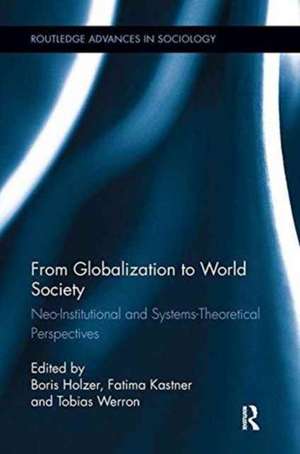From Globalization to World Society: Neo-Institutional and Systems-Theoretical Perspectives: Routledge Advances in Sociology
Editat de Boris Holzer, Fatima Kastner, Tobias Werronen Limba Engleză Paperback – 8 dec 2016
| Toate formatele și edițiile | Preț | Express |
|---|---|---|
| Paperback (1) | 489.87 lei 6-8 săpt. | |
| Taylor & Francis – 8 dec 2016 | 489.87 lei 6-8 săpt. | |
| Hardback (1) | 1060.25 lei 6-8 săpt. | |
| Taylor & Francis – 3 sep 2014 | 1060.25 lei 6-8 săpt. |
Din seria Routledge Advances in Sociology
-
 Preț: 385.11 lei
Preț: 385.11 lei -
 Preț: 152.39 lei
Preț: 152.39 lei -
 Preț: 309.12 lei
Preț: 309.12 lei - 20%
 Preț: 296.88 lei
Preț: 296.88 lei -
 Preț: 334.09 lei
Preț: 334.09 lei -
 Preț: 204.46 lei
Preț: 204.46 lei - 9%
 Preț: 865.99 lei
Preț: 865.99 lei -
 Preț: 310.81 lei
Preț: 310.81 lei -
 Preț: 326.40 lei
Preț: 326.40 lei -
 Preț: 311.41 lei
Preț: 311.41 lei - 8%
 Preț: 388.98 lei
Preț: 388.98 lei -
 Preț: 288.87 lei
Preț: 288.87 lei -
 Preț: 310.29 lei
Preț: 310.29 lei -
 Preț: 311.41 lei
Preț: 311.41 lei -
 Preț: 303.43 lei
Preț: 303.43 lei -
 Preț: 301.51 lei
Preț: 301.51 lei -
 Preț: 326.63 lei
Preț: 326.63 lei -
 Preț: 152.30 lei
Preț: 152.30 lei -
 Preț: 318.95 lei
Preț: 318.95 lei -
 Preț: 317.48 lei
Preț: 317.48 lei -
 Preț: 312.86 lei
Preț: 312.86 lei -
 Preț: 160.59 lei
Preț: 160.59 lei -
 Preț: 334.09 lei
Preț: 334.09 lei -
 Preț: 309.46 lei
Preț: 309.46 lei -
 Preț: 386.78 lei
Preț: 386.78 lei - 8%
 Preț: 388.92 lei
Preț: 388.92 lei -
 Preț: 310.60 lei
Preț: 310.60 lei -
 Preț: 309.99 lei
Preț: 309.99 lei -
 Preț: 310.51 lei
Preț: 310.51 lei -
 Preț: 283.77 lei
Preț: 283.77 lei -
 Preț: 327.36 lei
Preț: 327.36 lei -
 Preț: 295.10 lei
Preț: 295.10 lei - 8%
 Preț: 383.57 lei
Preț: 383.57 lei - 18%
 Preț: 1111.55 lei
Preț: 1111.55 lei -
 Preț: 445.38 lei
Preț: 445.38 lei - 18%
 Preț: 701.88 lei
Preț: 701.88 lei - 18%
 Preț: 1053.92 lei
Preț: 1053.92 lei - 18%
 Preț: 1002.36 lei
Preț: 1002.36 lei - 18%
 Preț: 1057.89 lei
Preț: 1057.89 lei - 20%
 Preț: 248.31 lei
Preț: 248.31 lei - 18%
 Preț: 1003.30 lei
Preț: 1003.30 lei - 18%
 Preț: 1109.21 lei
Preț: 1109.21 lei - 18%
 Preț: 998.56 lei
Preț: 998.56 lei - 18%
 Preț: 1061.22 lei
Preț: 1061.22 lei - 18%
 Preț: 1058.06 lei
Preț: 1058.06 lei - 18%
 Preț: 1002.36 lei
Preț: 1002.36 lei - 18%
 Preț: 1113.12 lei
Preț: 1113.12 lei
Preț: 489.87 lei
Nou
Puncte Express: 735
Preț estimativ în valută:
93.75€ • 101.80$ • 78.75£
93.75€ • 101.80$ • 78.75£
Carte tipărită la comandă
Livrare economică 23 aprilie-07 mai
Preluare comenzi: 021 569.72.76
Specificații
ISBN-13: 9781138291409
ISBN-10: 1138291404
Pagini: 348
Ilustrații: 6
Dimensiuni: 152 x 229 mm
Greutate: 0.47 kg
Ediția:1
Editura: Taylor & Francis
Colecția Routledge
Seria Routledge Advances in Sociology
Locul publicării:Oxford, United Kingdom
ISBN-10: 1138291404
Pagini: 348
Ilustrații: 6
Dimensiuni: 152 x 229 mm
Greutate: 0.47 kg
Ediția:1
Editura: Taylor & Francis
Colecția Routledge
Seria Routledge Advances in Sociology
Locul publicării:Oxford, United Kingdom
Public țintă
Postgraduate and UndergraduateCuprins
1. Introduction: From Globalization to World Society Boris Holzer, Fatima Kastner and Tobias Werron Part I: Differentiation of World Society 2. Comparing Systems Theory and Sociological Neo-Institutionalism: Explaining Functional Differentiation Rudolf Stichweh 3. The Two Faces of World Society: Formal Structures and Institutionalized Informality Boris Holzer 4. Embedding Regional Integration in the Fabric of a Differentiated World Society and a Differentiated System of World Politics Mathias Albert and Stephan Stetter Part II: Global Fields in World Society 5. What Do Nation-States Compete For?: A World-Societal Perspective on Competition for "Soft" Global Goods Tobias Werron 6. The Inclusion of Victims and the Globalization of Criminal Law Thorsten Bonacker 7. The Globalization of Transitional Justice: On the Diffusion of Norms, Standards and Institutions of Post-Conflict Justice in World Society Fatima Kastner 8. Religious Differentiation and World-Culture: On the Complementary Relationship of Systems Theory and Neo-Institutionalism Martin Petzke 9. Technical Knowledge and Instrumental Activism Raf Vanderstraeten Part III: Organizations in World Society 10. Decoupling and Coupling in Education Raimund Hasse and Georg Krücken 11. University Rankings Between Organization and Society Sven Kette and Veronika Tacke 12. Heterogeneity in World Society: How Organizations Handle Contradicting Logics Cristina Besio and Uli Meyer 13. The Diffusion of Organizations: The Role of Foreign Aid Stefan Kühl 14. From International to World Organizations Martin Koch Part IV: Comments 15. Commentary: Toward Understanding World Society George M. Thomas 16. Commentary: Theories of World Society John W. Meyer
Descriere
Since the 1970s, various approaches have tried to conceptualize "the global," yet few have addressed the full spectrum of social relationships. Exponents of the global approach have instead focused on particular domains such as politics or the economy. Under the label of "world society," some have suggested alternatives to the predominant equivocation of society and the nation-state. This book shares that objective and takes its point of departure from the two most ambitious projects of that theory: world polity research and systems theory. It maps out the common ground shared by both, and assesses their potential to inform empirical analyses of globalization.
















